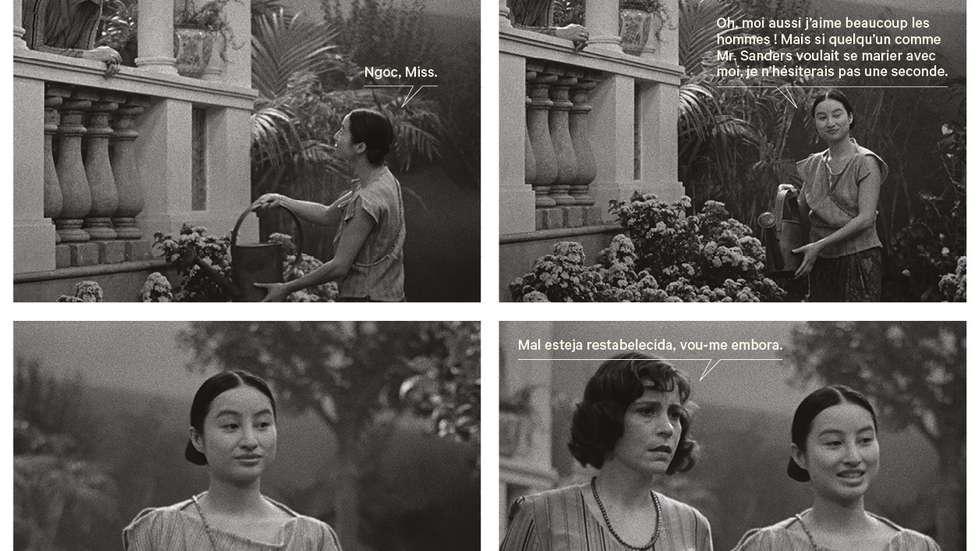Batalha Centro de Cinema, in Porto, will edit the film-fotonovela of Grand TourMiguel Gomes’ film, which will be released in Portuguese theatres on 19 September. Recovering a forgotten format, the Porto cinema ventures to say that it is “the first recorded cinema-photo-novel of Portuguese origin”.
The idea of adapting Miguel Gomes’ new film, which won the Best Director award at the Cannes Film Festival, something unprecedented in Portuguese cinema, “arose from a documentary exhibition on the literary magazine format of photo novels,” explains Guilherme Blanc, artistic director of Batalha, referring to The cinephotonovel: a forgotten printed cinemaexhibition on display at the Foyer of the Porto cinema until November 30.

Popular in Europe in the 1950s and 1960s, and strongly inspired by the success of fotonovelas, cinefotonovelas adapted films of that era to the printed format, reusing frames and photographs from the scene, and adding speech bubbles for lines and subtitles for narration. As a rule, each issue retold the film in stories of approximately 50 pages and 300 images. But in Portugal this format was not used.
“I could be wrong. In fact, I hope I am wrong, as it would be fantastic to discover previously unknown archives and collections. So far, my attempts to find other records have been unsuccessful,” says Belgian Jan Baetens, curator of the exhibition and specialist in non-canonical literature (comics, graphic novel, novelization “I suppose the reason for this ‘absence’ is the economic situation in Portugal between 1955 and 1965, when there was no room for anything other than very cheap cinematographic novelisations in small format and with few images,” he says. “Of course, it depends on the definition of cinema-photonovel, since in Portugal there have always been various forms of printed cinema. But since the genre is defined in the context of the exhibition, I don’t know of any other example of this type,” he says.
Guilherme Blanc also highlights the “period” of intense but ephemeral success of the format, marked by “a scarce cinematographic production” in Portugal. “We are in the middle of a dictatorship. There was a shortage of production and a shortage of readers,” he invited to speculate on the lack of national examples.
It was in this context that he thought it appropriate to adapt a Portuguese film into a photo-novel. Batalha’s artistic director immediately thought of Taboo (2012), but when he approached Miguel Gomes the director suggested great tour, showing him the film, which tells a story long tour Asian, designed in the footsteps of Edward, an official of the British Empire, and Molly, the bride who follows in his footsteps, determined to take him to the altar.
“Miguel’s works have an appropriate visual and narrative cadence that predisposes to this type of exercises. Nodo Taboo This was already noticed. When we saw the Grand Tour We realized that it is an adventure story and that from a formal point of view it is appropriate,” he says.
Given carte blanche – there was no degree of involvement from the director in the making of the magazine – Batalha Centro de Cinema began the “meticulous” work of translating the film into 56 pages that will reach bookstores this Thursday. “There was generosity [do Miguel Gomes] to allow us to work as authors and editors,” says Blanc, who writes the magazine edition with David Pinho Barros, researcher and “specialist in this area of comics and cinema.”
With a supposed interest in “precision,” the dialogue balloons correspond to the dialogue in the script co-written by the filmmaker with Mariana Ricardo, Telmo Churro and Maureen Fazendeir. “All the content is part of the existing textual component,” he says. “Everything is taken from the film, by my own choice.”
The cinema-photonovel Grand Tour The book has a print run of 1,000 copies and will be distributed through selected bookstores, such as Batalha or Cinemateca Portuguesa. “We want to produce for France, this hypothesis is being studied, there is interest,” he told El Observador.
Regarding the pioneering nature of the format, the director of the Porto cinema is cautious. “We researched in archives, we spoke with experts, collectors, there are some copies of photo novels, but we have no record of cinefotonovelas. [em Portugal]”, he says. However, “we do not have absolute certainty,” he assures, adding: “On the cover of the magazine we say probably.”
Source: Observadora
